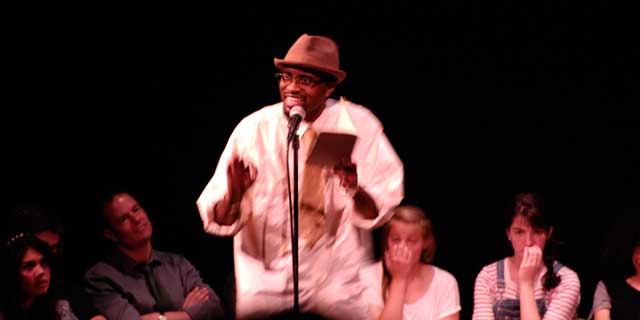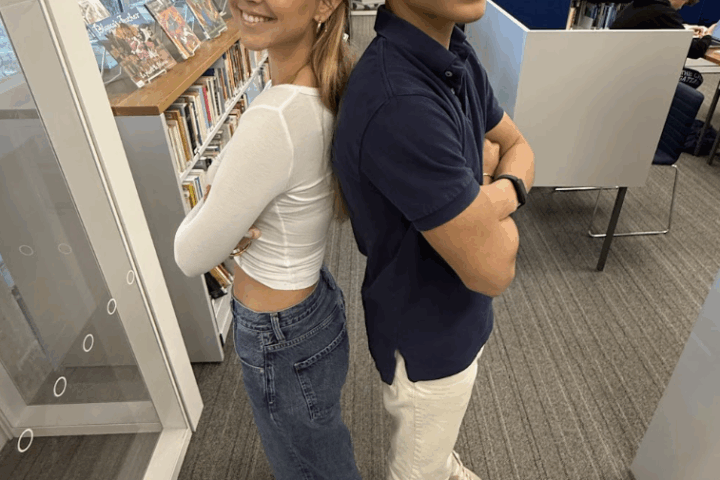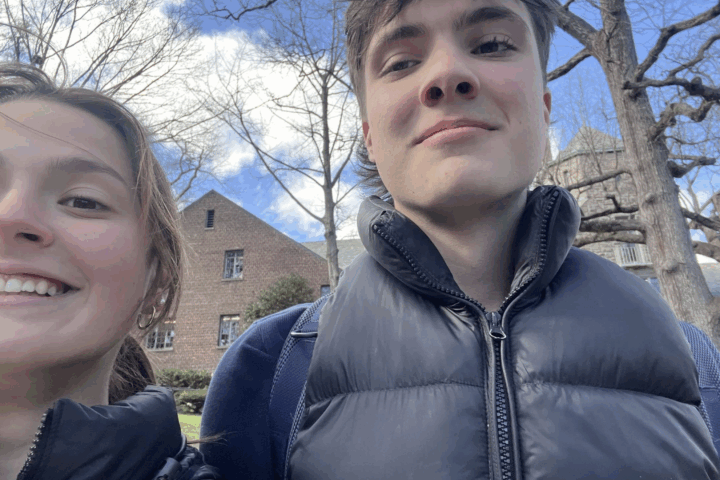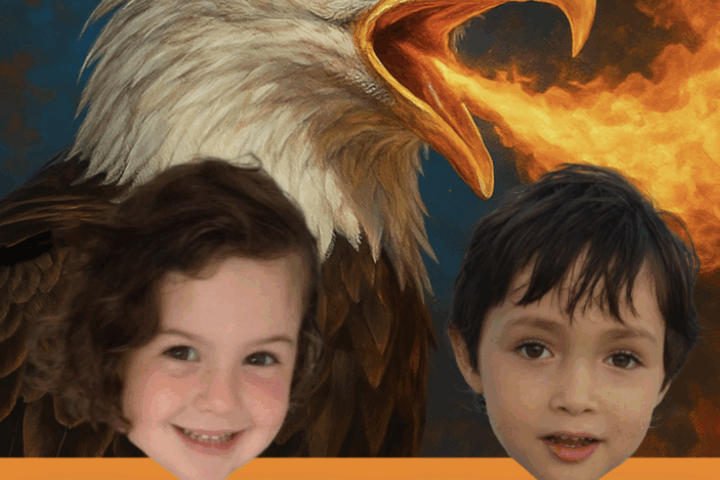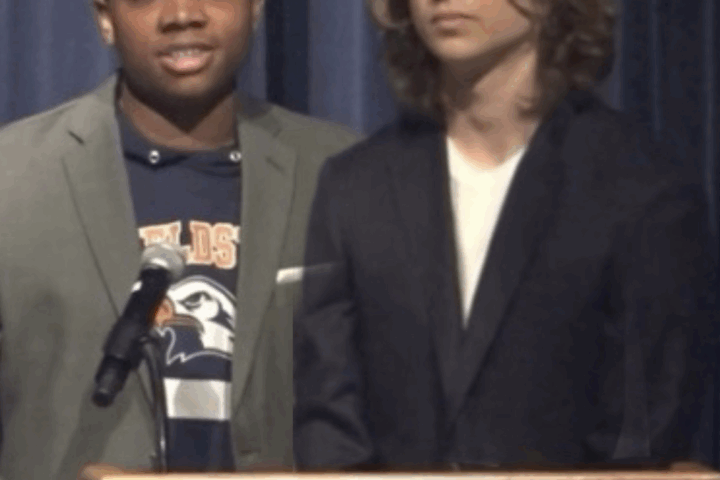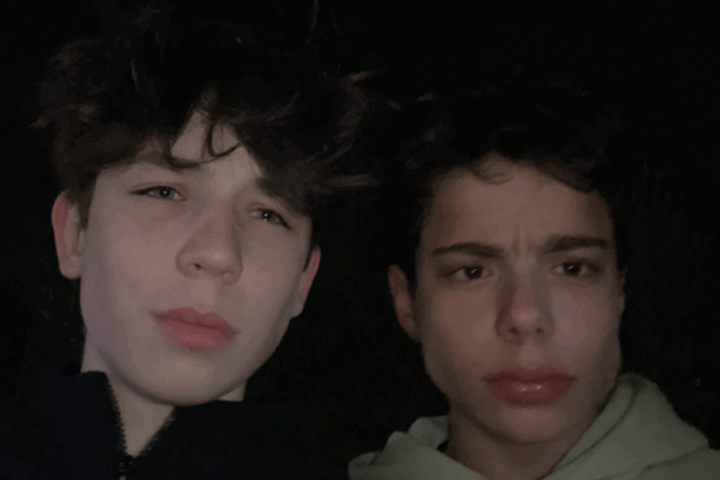Fieldston News: (to Alwin Jones): Although your wife has been teaching chemistry here for a few years, you are new to Fieldston this year. How are you liking it so far?
AJ: I’m enjoying Fieldston very much. I enjoy my students, the intellectual culture is welcome and I’m energized every day by our discussions. Our classes have a little bit of levity but I think a lot of us have been doing a lot of heavy work with intellectual inquiry and enjoying the journey that we share with each other as well as help each other along with. I’m enjoying it very, very much, lots of fun things happen.
FN: What classes are you teaching?
AJ: Themes in American Literature, in which we examine the relationship between literature and the idea of freedom, I’m teaching a class in the Caribbean and Latin America in which we examine the immigrant narrative of home and migration. I’m also looking at a Film and Literature class in which we examine several film and text both adaptations but also thematically related stuff.
FN: In light of your performance at the poetry assembly, how does your music career tie into your career as an educator?
AJ: I am a professor of African and Caribbean literature at Sarah- Lawrence, so I’m on a partial loan to Fieldston for the year. And part of my scholarly stuff is I do the research based on stuff that actually the other Dr. Jones was instrumental in helping me to gather in Guyana, since around 2009 we’ve been going back home to record and interview. It’s the beginning of my book project, the CD project.
FN: What’s your book project?
AJ: It’s just a collection of poetry that I’m working on that I wrote over the last year or two that tells the story of my family coming to Guyana from the Congo basin, while also telling the story of my grandmother and her growing up in Guyana, and lastly me and my growing up in Guyana. So it’s a three-part work like a memoir done in poetry.
FN: So you grew up in Guyana. (to Paulianda Jones) Where did you grow up?
PJ: I was born in Guyana, he was born in the country part and I was born in the city, and my dad was an agriculturist. He would travel all over Guyana because it’s a very fertile land. One of the places that he would go for part of the year was called Lethem, and it’s right next to Brazil. So I was there, growing up and taking classes with the indigenous Guyanese. I took classes in the woods, but part of the year I would be back in Georgetown. And then I moved to New York when I was six, but we left soon after, and then from age eight to thirty I was pretty much in the south. There, I grew up in Northern Virginia and I went to school, grad school, and college there. Post grad I was in Tennessee, but then after that I came here for a tenure track at a college but left the college and came to Fieldston.
FN: What was that decision like?
PJ: It was a very good decision for me. I had explored teaching high school right out of grad school, then I did the post doc and I thought about joining a pharmaceutical company like Merck and doing that type of research and work, but then I decided that the academic career was more friendly to having a family, in terms of schedule. So I gave the college education a try, but I found that I preferred the younger age. The students I had in college were more prepared to take a college level chemistry class so I wanted to work with the younger aged students to help them become more prepared themselves.
FN: When you were talking about your book project and the music, you said that the other Dr. Jones helped you with a lot of research. What role did she play in it?
AJ: We got a grant from Sarah Lawrence to go and do some of the research, and Dr. Jones was instrumental in helping me to organize getting the trip there, but also as we were going around because it’s very difficult at times, I needed to be not just behind the camera but in front of it because we were doing documentary work, so I needed stable hands. But also, just being present at one point, when I had a performance, being a friend and a familiar face and presence to say “I got you, you can do this” was instrumental in knowing she was there for me, and now it’s been fifteen years doing this, helping me to rehearse and holding the script as I try to memorize particular lines or running by ideas for what to shoot or questions to ask, she may ask a question about something that helps to trigger a memory, but that’s been a longstanding role in terms of memorization and getting my answers well rehearsed and correct.
FN: How long have you guys been together for?
PJ: Nine years
FN: How did you guys meet?
AJ: Grad school at UVA. On the basketball court.
PJ: I was just working out.
AJ: Yeah, we love sports.
PJ: We’re very competitive.
FN: What would you say, aside from these projects, are your hobbies?
PJ: We watch our kids. If we had free time to do something?
AJ: We are avid tennis players. And basketball. Biking, long distance biking. At one point we were runners.
PJ: I’m the only runner now. So if we do something now, it’s probably just a movie.
FN: Would you say you are a relatively competitive couple? You both are clearly very intelligent and you do a lot of activities together, so would you ever say that there’s competitiveness from that?
AJ: In sports, I would say so.
PJ: But in terms of anything else, I wouldn’t say so. We’re very supportive of each other. We’re a team.
FN: What’s it like working together at Fieldston?
PJ: It’s so big that you have to make an effort to see each other during the day.
AJ: And also different teaching schedules, we’re on different lunches. The joint commute is good for the environment and us though!
FN: Do either of you have the same students?
AJ: None of our students overlap now, but I have a bunch of former students of Dr. Jones’ (Paulianda).
PJ: I think it’s important for him to develop his own ideas about the students so we don’t really talk about them or our impressions because I feel like many people can be different students in science than in the other subjects like English, the two don’t relate at all. Some students are all around, but others are more one-sided.
AJ: You know, they see me around and so we try to have fun with it. We have played a few practical jokes.
FN: Such as?
PJ: When people ask if we know each other, we pretend that we’ve never met. I’ll just say “Oh yeah, that guy has the same last name as me. That’s funny.”
AJ: Yeah, that part is fun.
PJ: I’ll say, “He has a daughter named Farrah too,” and everyone just looks so confused.
AJ: Yeah, it’s just not something you assume. Jones isn’t an uncommon last name. So it works a lot of the time.

